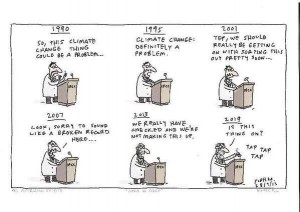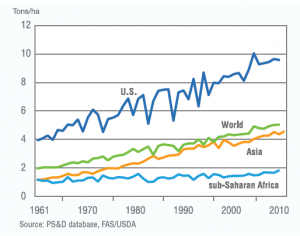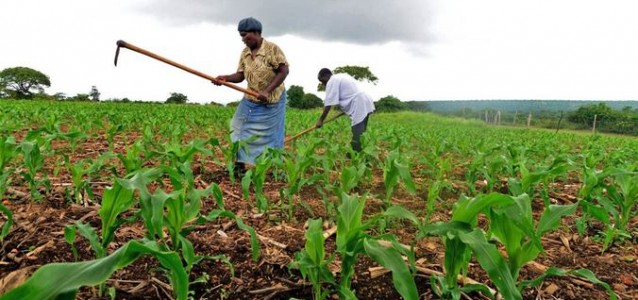25 years of sustained research and the IPCC continues to state with ever increasing confidence that climate change is here and here to stay. The worry now (if at all you are worried) is not on whether climate change is occurring but rather on how to mitigate and/or adapt. If you live in a low income country in sub Saharan Africa and you like to eat, this climate change thing could certainly be of interest to you. Yields of food crops of all kinds (maize, sorghum, soya, groundnuts, wheat etc.) are expected to decline by up to 30 % as a result of climate change, as early as the 2030s in some places…just in case you had it in mind to entertain “but I may just be dead and long gone by then” ideas . As for the urban folk, before you decide this isn’t your concern at all, bear in mind that you may end up having to part with a larger chunk of your ever shrinking (what with increasing fuel prices and all) pay checks as food prices rise sharply, driven by shortages.
. As for the urban folk, before you decide this isn’t your concern at all, bear in mind that you may end up having to part with a larger chunk of your ever shrinking (what with increasing fuel prices and all) pay checks as food prices rise sharply, driven by shortages.
Populations in low income countries in SSA are expected to double in the 21st century. Land for producing food is not going to increase (even if it could, that would be ill advised, given that land clearance for agriculture contributes significantly to greenhouse gas emissions (GHGs)). Degraded soils are not expected to improve. In short, food producers in the poorest region of the world are expected to feed doubling populations with the same increasingly shrinking and degraded lands under uncertain future climates. That’s quite an ask.
As if the task wasn’t hard enough, it is the most vulnerable food producers from which these regions look to provide future food supplies, small holder farmers. Small holder farmers provide food and livelihoods to a large proportion of Africa’s population, 70% of which is rural. These farmers have performed this task with varying degrees of success, with limited technologies and poor infrastructure, under poor service provision and harsh policy environments. On average, crop yields in Africa have been stagnant for decades (see figure for maize yields below). Clearly the prospects for future food supply with the added challenge of a changing climate are not promising.

In 1960, maize yields in Africa and Asia were the same. Over the years, with adoption of improved technologies (fertiliser, varieties, cultivation methods etc), maize yields in Asia have increased to 4.5 tons/ha while yields in Africa have on average remained constant.
The cynical among us would probably be thinking “oh well it seems this agriculture thing is quite hopeless, why not engage in some other forms of livelihood activities apart from agriculture?” As it turns out, gross domestic product (GDP) growth from agriculture is almost 3 times more effective in reducing poverty than growth from any other sectors of the economy. Furthermore, agriculture contributes up to 30 % to GDP in many countries in Africa, such that neglect of the agricultural sector could have significant negative impacts on economies in Africa and by extension will increase food insecurity and poverty levels. Sadly, or not (depends who is saying) we are stuck with agriculture if we entertain any hopes of lifting large populations in Africa out of poverty. How do you go about lifting entire population out of poverty via agriculture with unfriendly future prospects?
Green revolution? The green revolution through scientific breakthroughs and improved access to vital inputs greatly improved agricultural production in Asia. It didn’t pick up in Africa then (1960s) and five decades later its still pretty much a non-event on the continent, baring islands of success. Some would say that boat has long since sailed and Africa is standing on the dock unsuccessfully trying to call it back due social, political and economic constraints. World Food Prize winner Gebisa Ejeta writing in “African Green Revolution Needn’t Be a Mirage” figures it is still achievable. Ray of light?
Production system overhaul? Some suggest some sort of an overhaul of the current food production system or at least the use of “radical methods” such as molecular techniques, saline water farming systems etc. as a solution to improving agricultural production. Researchers and development organisations are already struggling to get African farmers to adopt “simple and cheap” well tested strategies (Conservation Agriculture anyone?). Maybe, let’s start there before we get ahead of ourselves with the out-of-the-box ideas? Some wise guy once said, simplicity is the ultimate sophistication. Could modernising and scaling up already existing “simple” local innovations do the job better?
Investment and Commercialisation? Regularly it has been suggested that if we could make small holder farmers move from semi-subsistence to the more profitable commercial production systems, a large chunk of the ills of a small holder dependent food system will be cured. How do you go on to invest in a production system that is so prone to climate variability and change among other challenges? Do I hear irrigation and insurance systems? Well, all is well and good with small holder irrigation and insurance until you realise that for a future we are uncertain about, large inflexible investments may not be prudent especially when you consider that small holder farmers seldom own collateral or the land that they draw their livelihood from. There is also the volatile global food market and cheap higher quality heavily subsidised European agricultural product to consider as well. If you were a money man, would you be making this sort of investment?
After all is said and done, small holder productivity is not the end and all of African future food supply woes. We still have post production hickups to deal with (post harvest storage, transportation, markets, policy etc.), conflict (war and instability), corporate land grabs, corruption, diseases…I could go on and on. Whatever direction the continent ends up taking to promote food security, what is quite apparent so far is that if you live in sub Saharan Africa, a great part of your future food depends on a production system that has historically not performed too well, is the most prone to environmental (climate change and variability), social, political and economic pressure and the least capable to cope and adapt. Some prospects eh? On the flipside, there are a multitude of examples that demonstrate the potential and ability of the continent to meet its food security needs in the present and the future, talk Malawi and Ethiopia. How can these good examples be used to shine light for a better more promising future for food on the continent?
(Feature image from http://cdn.mg.co.za/crop/content/images/2013/05/27/swazifarmers.jpg/676×380/)
